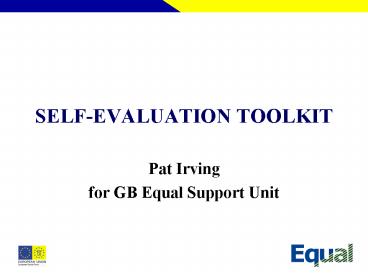SELFEVALUATION TOOLKIT PowerPoint PPT Presentation
Title: SELFEVALUATION TOOLKIT
1
SELF-EVALUATION TOOLKIT
- Pat Irving
- for GB Equal Support Unit
2
QUESTIONS POSED
- Why evaluate?
- What to evaluate?
- Who should evaluate?
- How to evaluate?
3
WHY EVALUATE?
- Project management tool
- Accountability
- Marketing/promotional tool
- Programme requirement
4
WHAT TO EVALUATE?
- Inputs
- Process
- Outputs
- Outcomes - impacts/effects
- Context
5
WHAT TO EVALUATE? (2)
- Partnership activity
- Domestic
- Transnational
- Equals Leading Principles
- Innovation and added value
- Equal Opportunities
- Involving disadvantaged and excluded groups
- Empowerment
- Transnationality
- Mainstreaming and policy impact
6
WHO SHOULD EVALUATE?
- Development Partnerships
- internal / self evaluation
- external - use of external evaluator
- Decide on skills needed consult with
stakeholders - Link internal and external evaluations
7
GETTING STARTED
- National/transnational aims and objectives
- Source documents
- DPA
- National/transnational workplans
- Consult with partners and stakeholders (incl.
mainstreaming target audience) - Commissions Guide on transnational
co-operation has suggestions for evaluation
8
EVALUATION PROCESS
9
DESIGN (1)
- Baseline
- Indicators
- Evaluation Approach
10
DESIGN (2)
11
BASELINE / INDICATORS
- Baseline
- Pertinent
- Measurable
- Indicators
- Process
- Output
- Qualitative
- Quantitative
12
INFORMATION COLLECTION - DATASOURCES
- Development Partnership Agreement (DPA)
- Administrative data
- Surveys / questionnaires
- Interviews
- Observational methods
13
ANALYSIS (1)
- Sift and sort
- Appropriateness
- Information overload
- Open minded
14
ANALYSIS (2)
- So what?
- What are our outputs?
- Have we made a difference?
- What difference did we make?
- How did we make a difference?
- Why did we make a difference?
- For whom (and how many?)
15
REPORTING
- Structure
- Audience
- Timing - interim / formative final
- Explain method
- Provide context
- Present evidence
- conclusions
- judgements
- recommendations
PowerShow.com is a leading presentation sharing website. It has millions of presentations already uploaded and available with 1,000s more being uploaded by its users every day. Whatever your area of interest, here you’ll be able to find and view presentations you’ll love and possibly download. And, best of all, it is completely free and easy to use.
You might even have a presentation you’d like to share with others. If so, just upload it to PowerShow.com. We’ll convert it to an HTML5 slideshow that includes all the media types you’ve already added: audio, video, music, pictures, animations and transition effects. Then you can share it with your target audience as well as PowerShow.com’s millions of monthly visitors. And, again, it’s all free.
About the Developers
PowerShow.com is brought to you by CrystalGraphics, the award-winning developer and market-leading publisher of rich-media enhancement products for presentations. Our product offerings include millions of PowerPoint templates, diagrams, animated 3D characters and more.

